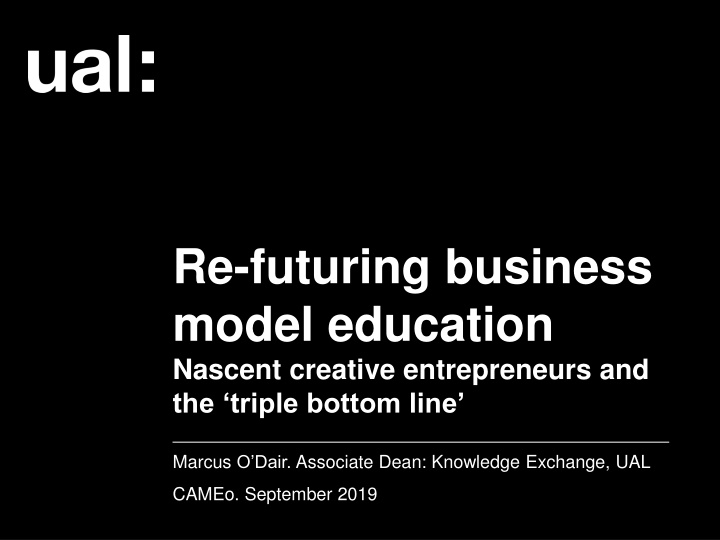
Reimagining Business Models and Entrepreneurship in the Creative Economy
Explore the intersection of business models, entrepreneurship, and education in the creative industries through insightful discussions on balancing enthusiasm with career realities, creating multiple types of value beyond monetary gains, and challenging capitalist realism. Discover how academia influences the perception of the creative economy and the importance of a holistic approach to entrepreneurship education.
Download Presentation

Please find below an Image/Link to download the presentation.
The content on the website is provided AS IS for your information and personal use only. It may not be sold, licensed, or shared on other websites without obtaining consent from the author. If you encounter any issues during the download, it is possible that the publisher has removed the file from their server.
You are allowed to download the files provided on this website for personal or commercial use, subject to the condition that they are used lawfully. All files are the property of their respective owners.
The content on the website is provided AS IS for your information and personal use only. It may not be sold, licensed, or shared on other websites without obtaining consent from the author.
E N D
Presentation Transcript
Re-futuring business model education Nascent creative entrepreneurs and the triple bottom line Marcus O Dair. Associate Dean: Knowledge Exchange, UAL CAMEo. September 2019
HEIs and the creative economy Academics are complicit in propagating the very notion of a creative economy, often unconsciously and uncritically reproducing the normative elements of creative economy discourse. Moreton (2018)
Possible tensions How do we balance our and our students enthusiasm and commitment to the cultural sector with a realistic appraisal of the reality of careers? O Connor et al (2019)
Re-imagining business models Every business has a business model, whether they realise it or not Chesbrough (2006)
Self-identification Reluctant entrepreneurs in the cultural and creative industries Haynes and Marshall (2017)
Multiple types of value Business models are not only about money-making. They are about much broader questions of value creation and capture social, artistic, environmental or financial. Rex et al (2019)
Beyond the business school Entrepreneurship education should not be owned by one part of a university Carey and Naudin (2006) Hindle (2007) Jones et al (2012) Rae (2004)
Business modelling A heuristic technique organisations use to identify the range of activities and relationships (internal and external) they undertake where different kinds of value are exchanged Rex et al (2018)
Capitalist realism Not only is capitalism the only viable political and economic system, but also that it is now impossible even to imagine a coherent alternative Fisher (2009)
People, planet, profit Triple bottom line: economic growth social justice environmental sustainability Elkington (1997) Honeyman and Jara (2019)
Business model design project Enterprise education from the art school Business model visualisation (Osterwalder and Pigneur 2010) but specific to the creative and cultural industries Design-led approach Tested with graduate entrepreneurs and focus groups of fellow students Refined in response to feedback
m.odair@ arts.ac.uk






















